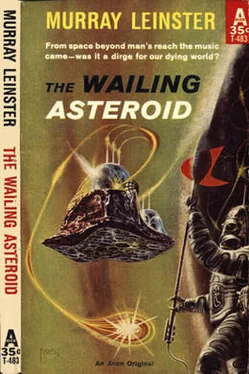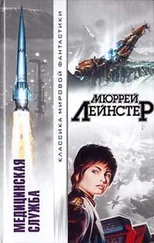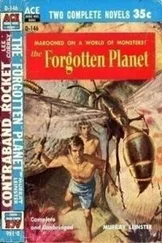On Earth, of course, there was no such eccentric jubilation. It was observed that crawling red sparks in the gravity–field detectors winked out. As hours and days went by, it was noticed that the solar system continued to exist, and that people stayed alive. It became evident that some part of the terror some people had felt was baseless. And naturally there was much resentment against Burke because he had caused so many people so much agitation.
Within two weeks a fleet of small plastic ships hurtled upward from the vicinity of Earth's north magnetic pole and presently steadied on course toward the fortress asteroid. Burke was informed severely that he should prepare to receive the scientists they carried. He would be expected to coöperate fully in their investigations.
He grinned when Pam handed him the written sheet.
"It's outrageous!" snapped Sandy. "It's ridiculous! They ought to get down on their knees to you, Joe, to thank you for what you've done!"
Burke shook his head.
"I don't think I'd like that. Neither would you. We'll make out, Sandy. There'll be a colony started on that world the matter–transposer links us to. It might be fun living there. What say?"
Sandy grumbled. But she looked at him with soft eyes.
"I'd rather be mixed up with—what you might call pioneers," said Burke, "than people with reputations to defend and announced theories that are going to turn out to be all wrong. The research in this fortress and on that planet will make some red faces, on Earth. And there's another thing."
"What?" asked Sandy.
"This war we've inherited without doing anything to deserve it," said Burke. "In fact, the Enemy. We haven't the least idea what they're like or anything at all about them except that they go off somewhere and spend a few thousand years cooking up something lethal to throw at us. They tired out our ancestors. If they'd only known it, they won the war by default. Our ancestors moved away to let the Enemy have its own way about this part of the galaxy, anyhow. And judging by past performances, the Enemy will just stew somewhere until they think of something more dangerous than artificial sun–masses riding through our solar systems."
"Well?" she demanded. "What's to be done about that?"
"With the right sort of people around," said Burke meditatively, "we could do a little contriving of our own. And we could get a ship ready and think about looking them up and pinning their ears back in their own bailiwick, instead of waiting for them to take pot–shots at us."
Sandy nodded gravely. She was a woman. She hadn't the faintest idea of ever letting Burke take off into space again if she could help it—unless, perhaps, for one occasion when she would show herself off in a veil and a train, gloating.
But it had taken the Enemy a very long time to concoct this last method of attack. When the time came to take the offensive against them, at least a few centuries would have passed. Five or six, anyhow. So Sandy did not protest against an idea that wouldn't result in action for some hundreds of years. Argument about Burke's share in such an enterprise could wait.
So Sandy kissed him.
Transcriber's Note: The following sentence has been deleted at this point: "Interiors, Inc., would push the idea of a a bomb shelter or in an atomic submarine where it would cation." This is a possible printer error. A later edition of this work also has this sentence deleted.







